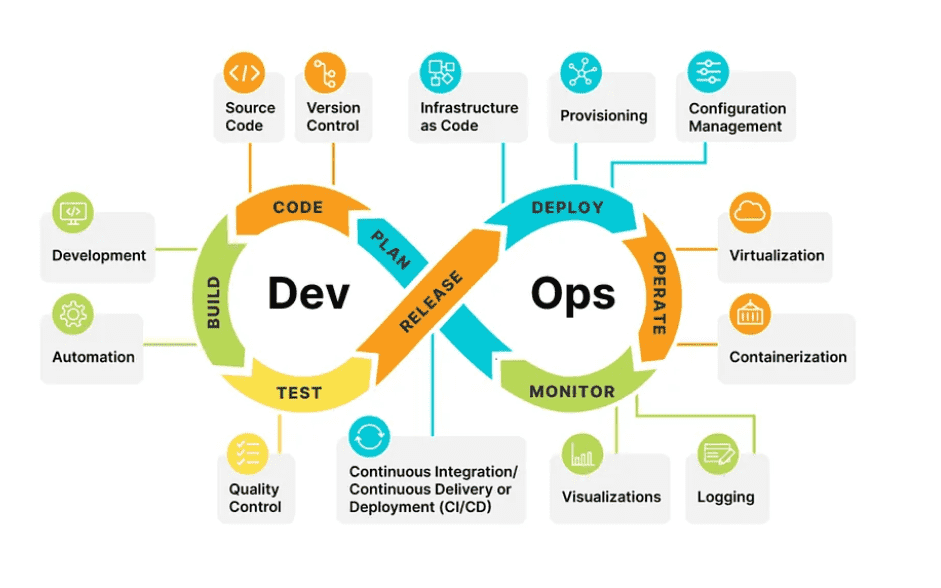DevOps Certification Training Course with Gen ...
- 189k Enrolled Learners
- Weekend/Weekday
- Live Class

In this article, let’s navigate some of the best DevOps practices that have been followed by businesses, small and large. These best DevOps practices will give you a starting point of how to approach DevOps integration into your processes, too!
But before we discuss the best practices of DevOps, let’s quickly recap the basics of DevOps.
At the heart of DevOps are practices and approaches that support the process of breaking down the walls between software developers (Dev) and IT administration (Ops), creating a culture of cooperation and shared accountability. The aim is to minimize development time, enhance release frequency, and make releases more stable, all of which are carried out in accordance with business goals.
With the basics settled, let’s now look at eight best practices for implementing DevOps. These include both DevOps architecture and monitoring best practices. So, make sure you assess through each to simplify your DevOps journey in the long run!
 Agile project management is the basis of DevOps, which stresses a flexible approach, continuous improvement, and going live with high-quality products. It provides a platform for good communication and collaboration among team members.
Agile project management is the basis of DevOps, which stresses a flexible approach, continuous improvement, and going live with high-quality products. It provides a platform for good communication and collaboration among team members.
’Shift Left’ means integrating and testing code as often as possible as soon as it is developed. Continuous Integration/Continuous Deployment (CI/CD) pipelines automate the process of application building, testing, and deployment. These pipelines provide better feedback and faster releases, enabling teams to perform better.
The selection of appropriate tools plays an important part in the DevOps success. DevOps pipelines are built on tools for version control, an ongoing integration process, automatic deployment, and configuration management.
Automation is DevOps’ core principle. Through repetitive task automation, machines allow workers to devote time to more significant responsibilities. In terms of execution, this can involve automating tasks such as code deployments, testing, infrastructure setup, and monitoring. This approach enhances consistency and reliability throughout the process.
Constantly digging into DevOps pipeline and applications gives a chance to see problems within their infancy stage. It is crucial to execute monitoring and logging on a comprehensive level in order to maintain transparency and quickly troubleshoot.
Beyond monitoring, observability allows teams to understand the state of their system from the outside, using the output it produces. This is critical for diagnosing and solving problems in complex systems.
 Continuous feedback mechanisms, such as customer feedback, performance metrics, and process reviews, are essential for the iterative improvement of products and processes in a DevOps culture.
Continuous feedback mechanisms, such as customer feedback, performance metrics, and process reviews, are essential for the iterative improvement of products and processes in a DevOps culture.
Undoubtedly, the most crucial thing is cultural reform that enables DevOps. Creating an atmosphere that promotes team efforts, acquiring lessons from failures, and emphasizing customer satisfaction are fundamental for the implementation of DevOps methods.
Now that you briefly understand some of the best DevOps practices, one important question remains – how to implement DevOps practices? We’re here to help you, and in that light, let’s quickly look at how you can get these best practices into your own work ethos.
This Edureka DevOps Tutorial for Beginners will help you learn DevOps concepts and DevOps tools with examples and demos. You will understand how a DevOps pipeline can be imagined for existing infrastructure. Furthermore, it will cover different DevOps projects & phases.
Undertaking the DevOps journey is an important step towards a more centralized and continuous activity in software production along with the IT teams. The move to DevOps is not an isolated procedural update. It is a mindset change where workflows get streamlined, and automated processes create a constant feedback loop.
Let’s explore how we can foster this transformation:
These are some of the crucial steps you must follow to effectively implement DevOps practices in your projects. However, understanding and applying DevOps principles effectively requires more than just a will to change; it necessitates targeted learning and skill acquisition.
If you have just started your DevOps journey, then joining a DevOps training course is the best option. This introductory course is a great start to the road to DevOps implementation, providing future practitioners with the tools to maximise their effectiveness through integrated development and operations.
DevOps is not only a tool or a practice, but a philosophy that needs the entire organisation to be consistent and implement it properly. Through the application of DevOps best practices, teams can advance collaboration, refine processes, and deliver resilient and high-quality software faster and more reliably.
Working professionals who want to get more comprehensive and specific knowledge in DevOps can check out the DevOps Engineer Course offered by Edureka for more focused and specialised DevOps training. This is the best way to prepare oneself for DevOps transformation, offering skills in managing intricate systems and building a competitive organisation.
Best DevOps practices can be linked to collaborative ideologies focused on agile project management, CI/CD, automation, monitoring and observability, continuous feedback, and creating a culture of cooperation.
Low-code/no-code applications are one of the next big things that have already started to gain significant traction in DevOps practices. This practice fuels the delivery pipelines with rapid prototyping and development processes.
The successful practical DevOps application includes the adoption of main concepts, continuous learning and adaptation to new technologies and tactics. This also includes the cultivation of a collaborative culture and persistence in the improvement of a business process.
Related FAQ
Which is better for my career further DevOps or Data Science?
 Thank you for registering Join Edureka Meetup community for 100+ Free Webinars each month JOIN MEETUP GROUP
Thank you for registering Join Edureka Meetup community for 100+ Free Webinars each month JOIN MEETUP GROUPedureka.co